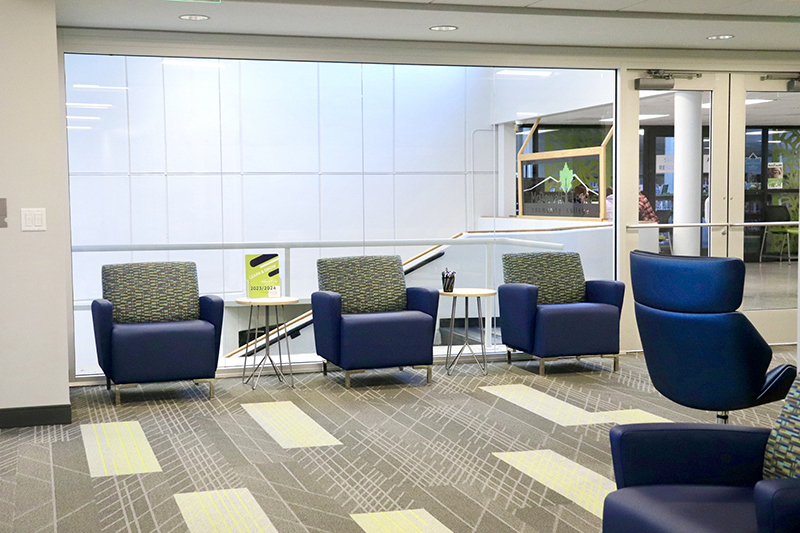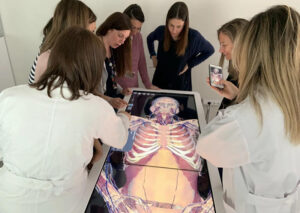A grant from the Appalachian Regional Commission (ARC) is helping McDowell Technical Community College better prepare future nursing graduates to provide high-quality health care and to fill a myriad of vacant nursing positions, both locally and throughout the region. The $350,000 grant, representing half of the total project costs, is playing a critical role in establishing and growing the college’s first stand-alone associate degree nursing (ADN) program, which will graduate its first cohort of students in May.

Previously, McDowell Tech participated in a consortium with Cleveland and Isothermal Community Colleges to provide nursing training, but that consortium was recently disbanded and each of the colleges is now operating individual associate degree nursing programs to better meet local and regional workforce demands.
“Nursing care is becoming increasingly complex, and it is essential that we provide our graduates with the tools they need to develop sound clinical judgement and provide exceptional patient care in a safe and nurturing environment,” said Dr. Kim Amos, Director of Nursing Education at McDowell Tech. “We do that by integrating active learning strategies within not only the classroom setting, but also in skills labs, simulation labs and, of course, various clinical settings.”
McDowell Tech currently has partnerships with four hospital systems, local health departments, hospice care centers, mental health facilities, long-term care facilities and ambulatory/community care centers to provide clinical training sites and diverse learning experiences for ADN students.
Although the college had existing equipment, supplies, skills labs and simulation labs, adding additional students became an impetus to review program needs. The college worked with key health care partners to develop a plan to provide evidence-based best practices in health care training and a specific list of new equipment, supplies and infrastructure needs to help faculty and administrators accomplish their training goals.
Because there are no recurring statewide resources available for startup costs for new programs, administrators at the college began to strategize ways to implement their new plan and associated funding needs.
Outside grants and local and state funding sources helped provide approximately $350,000 for some of these new needs and became a “local match” for the ARC grant. Personnel costs were a significant piece of this local match. Two additional faculty positions and a Health Science Success Coach were hired to serve new students. A GlaxoSmithKline grant helped support the health science coaching position, while an Expanding Economic Opportunity Grant provided funding for two second-year nursing instructor positions.
Equipment included an Anatomage Simulation Table, described by the supplier as “…the most technologically advanced 3D anatomy visualization system for anatomy education.” Existing equipment provided by state equipment funds served as additional match funding.
The ARC grant has specifically paid for upgrades in four classrooms, including mobile tables, desks, seating, individual whiteboards for student activities, and a wall-mounted attachment for display of student whiteboards. Equipment upgrades have included a new speaker system, large TV screen, 3 large-screen smartboards, ceiling-mounted screens with projection capabilities, 2 mobile workstations, 4 workstation computers, a medication administration system, simulation ventilator, simulation defibrillator, and a simulation transport ventilator.
Appalachian Regional Commission expects that funding provided to the college will help build Appalachia’s “workforce ecosystem” that will help “Appalachian residents obtain a job, remain on the job and develop a financially-sustaining career pathway,” specifically in healthcare. Positions in healthcare represent over 15.5% of all McDowell County employment needs, compared to 12% statewide. It is expected that new graduates will serve two local hospital systems (HCA Mission Hospitals and Rutherford Regional Hospital) and three healthcare agencies, with approximately 68 ADN nurses entering the workforce within approximately two years.
According to the agency’s website, “The Appalachian Regional Commission (ARC) is an economic development partnership entity of the federal government and 13 state governments focusing on 423 counties across the Appalachian Region. ARC’s mission is to innovate, partner, and invest to build community capacity and strengthen economic growth in Appalachia.”
“We are confident that our nursing students are being provided top-notch training and will rise to meet the challenges demanded of them as they enter the workforce,” said Ryan Garrison, MTCC Interim President. “The generosity of the Appalachian Regional Commission in providing funding for equipment and supply upgrades in our classrooms and labs helps ensure that McDowell Tech will remain a key partner in workforce and economic development in McDowell County and throughout the region.”
To learn more about the nursing programs at McDowell Tech, visit https://mcdowelltech.edu/academic-degree-programs/nursing-associate-degree/ or call Heather Buchanan, Health Sciences Success Coach, at 659-0495.





